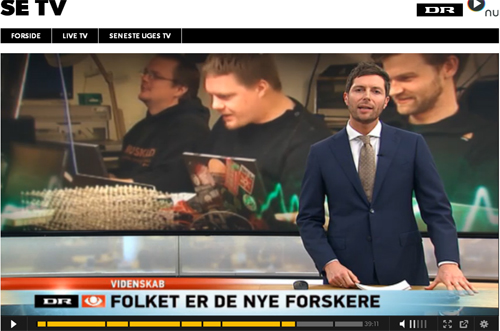DR1: University of Copenhagen and Biohackers begin collaboration
OPEN SOURCE: Head of Center for Synthetic Biology Professor Birger Lindberg Møller is now acting as scientific advisor for the biohackers in the association BiologiGaragen – the first of its kind in Denmark. National TV-channel DR1 reports on the collaboration.

The news program explained showed how biohackers have established themselves in Copenhagen as one of the do-it-yourself groups in the makerspace Labitat. They call their group BiologiGaragen. The tv-report shows how Labitat's basement in Frederiksberg, Copenhagen, looks more like a storage room for an electronics store, but taking a closer look, one notices that BiologiGaragen's corner is filled with rather unusual objects – advanced lab equipment for molecular biological work, among other things.
The prominent 5 minute feature clip also includes head of Center for Synthetic Biology Birger Lindberg Møller explaining why he is supporting this group:
“The entrepreneurial spirit in the Do-It-Yourself movement is amazing. These pioneers are inspiring to witness for university researchers and research-based companies alike. In return, we can help them with our solid experience. So this new collaboration is beneficial for everybody” he says.
The TV-report clealy shows how the orderly and polished laboratories at University of Copenhagen are visually very different from BiologiGaragen’s laboratory, which is built under a modest budget in a basement in Copenhagen. But the goals are often the same: Scientific curiosity, innovation and development of affordable products, when comparing to the prices of similar conventional equipment.
As an example of the projects that the members of Labitat and BiologiGaragen undertake, co-founder of BiologiGaragen, Martin Malthe Borch shows the smart phone app he developed, which is able to count microbial colonies and monitor their growth rate. This app can be download by anyone for free, while similar equipment from conventional manufacturers costs around 3500 $ (20 000 DKK). This is good news for many schools and other public institutions, which are currently subject to many budget cutting rounds.
New Source of Societal Growth
Professor Birger Lindberg Møller believes that it is essential that University of Copenhagen engages itself in these new independent invention and innovation environments, which are based on open sharing of knowledge - in the stead of rivalizing.
"New types of products will come out of these peoples' unorthodox combination of dexterity, skills and interest in new technology. The DIY movement has the potential to become new sources for economic growth, exactly as the government is seeking" says the professor, who will remain optimistic if more people will be inspired by the open knowledge sharing of the Do-It-Yourself movement" he says and continues:
"In synthetic biology, it is plain to see that open knowledge sharing lets our research progress in leaps and bounds - for the benefit of researchers, businesses and society", says Birger Lindberg Møller, while he emphasizes the need for combining this development with new types of business models.
This new type of collaboration between biohackers and a university professor was also posted online by the University of Copenhagen on its front page. read the danish press release here.
The collaboration between the professor and the biohackers was also featured in the written media:
- Weekendavisen printed a feature story by Lone Frank (only available through payment).
- Research Europe wrote a story about Novozymes and the University's interest in the biohackers
- Information featured a story of the collaboration
- Ingeniøren followed up the story with a short interview with biohacker Martin Malthe Borch: "Novozymes sponserer danske biohackere".
Visit the hompage of Labitat here: https://labitat.dk/
Visit the homepage of BiologiGaragen here: http://biologigaragen.org/
Visit the homepage of Novozymes here: http://novozymes.com/
